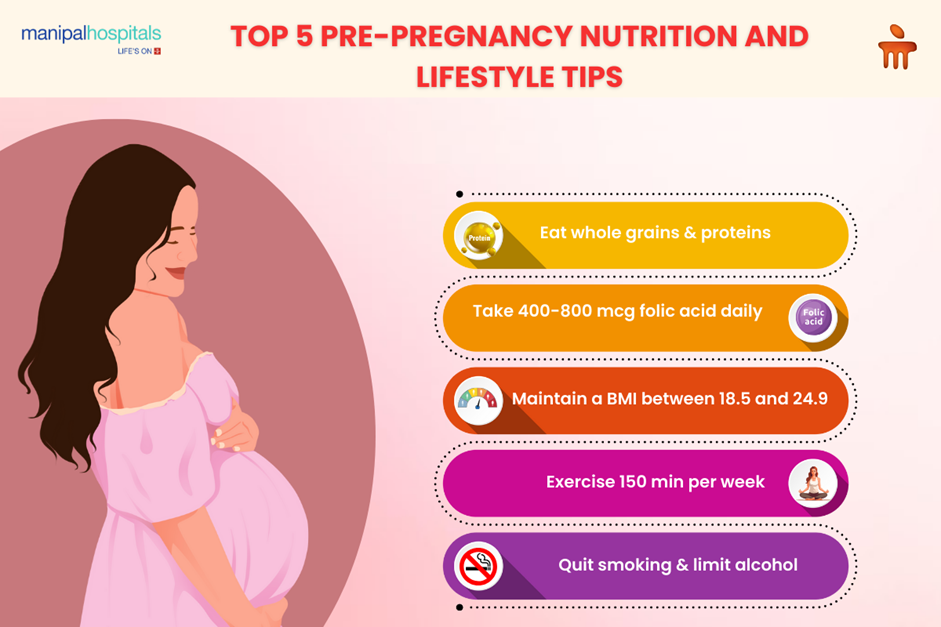
Listen to article
Loading audio...
Preparing for a healthy pregnancy remains vital for both a mother and her baby. Indian women face substantial risks during pregnancy due to high maternal death rates, stemming from limited healthcare access, malnutrition, delayed medical intervention, and pregnancy complications. Therefore, a pre-pregnancy or preconception checkup with an experienced gynaecologist becomes essential to detect and handle possible health risks. This blog underlines the critical importance of preconception medical consultations for achieving successful pregnancy outcomes.
Synopsis
Why Preconception Checkups Matter?
An antenatal or preconception checkup helps detect hidden health issues that could impact both your pregnancy and your baby’s health. Managing conditions like diabetes and high blood pressure beforehand reduces the risk of complications.
Approximately fifty per cent of pregnancies are unplanned, yet such unforeseen pregnancies face elevated risks for premature births as well as infants with low birth weights. A pre-pregnancy consultation with an expert gynaecologist in Bangalore ensures a healthy pregnancy.
Key Health Factors to Address
Addressing key health factors before pregnancy is crucial for the well-being of both mother and baby. Identifying and managing these factors can lead to healthier pregnancy outcomes.
Below are essential health aspects to consider:
-
Medical History Review: Discuss existing conditions like diabetes, hypertension, or thyroid disorders with your healthcare provider.
-
Medication Assessment: Review all medications, including over-the-counter drugs and supplements, to ensure they're safe for pregnancy.
-
Mental Health Screening: Address stress, depression, or anxiety with a professional to ensure emotional readiness for pregnancy.
-
Family Health History: Collect your family's health history to identify factors that might affect your baby or your ability to become pregnant.
Nutritional and Lifestyle Guidance
Preparing for pregnancy involves adopting a healthy diet and lifestyle to support maternal and fetal health. Below are key recommendations to consider:

-
Balanced Diet: Consume fruits, vegetables, whole grains, lean proteins, and healthy fats to provide essential nutrients.
-
Folic Acid Supplementation: Take a daily supplement of 400-800 micrograms of folic acid.
-
Maintain a Healthy Weight: Achieve a body mass index (BMI) from 18.5 to 24.9 to reduce pregnancy complications.
-
Regular Physical Activity: Engage in at least 150 minutes of moderate aerobic activity weekly, along with muscle-strengthening exercises.
-
Avoid Harmful Substances: Eliminate tobacco use, limit alcohol consumption, and avoid exposure to environmental toxins to promote fetal health.
Vaccinations and Preventive Care
Ensuring appropriate vaccinations and preventive care before pregnancy is vital for the health of both mother and baby. Below are key recommendations to consider:
-
Measles-Mumps-Rubella (MMR) Vaccination: Ensure immunity to prevent congenital infections; avoid pregnancy for at least 4 weeks post-vaccination.
-
Varicella (Chickenpox) Vaccination: Verify immunity; if you are susceptible, get vaccinated and delay conception for at least four weeks.
-
Hepatitis B Vaccination: Recommended for women at risk of infection to prevent maternal and neonatal complications.
-
Influenza Vaccination: Vaccinate before or during pregnancy to protect against seasonal flu.
-
Tetanus, Diphtheria, and Pertussis (Tdap) Vaccination: To protect newborns from pertussis, administer the vaccine during each pregnancy, preferably between 27 and 36 weeks.
Conclusion
Preconception care is vital for a successful pregnancy. Lifestyle choices, such as maintaining a balanced diet, regular exercise, and avoiding harmful substances, can influence fertility and the baby's health. If you are planning to embark on a parenthood journey, it is recommended to consult expert gynaecologists for a pre-pregnancy checkup that effectively addresses any medical conditions and also ensures the timely administration of vaccinations to prevent potential complications.
FAQ's
High stress levels can disrupt hormone balance, affecting ovulation and sperm quality. Managing stress through relaxation techniques can improve fertility.
Yes, gum infections and poor oral health can increase the risk of preterm birth and low birth weight. Regular dental checkups are essential.
Moderate caffeine intake (less than 200 mg per day) is generally safe, but excessive consumption may reduce fertility and increase miscarriage risk.
Fertility can return immediately or take a few months, depending on the type of contraception used. A doctor's consultation can help assess readiness.
Yes, exposure to pollutants, pesticides, and chemicals in plastics can lower fertility. Reducing exposure and choosing organic options can help improve reproductive health.



















 4 Min Read
4 Min Read











